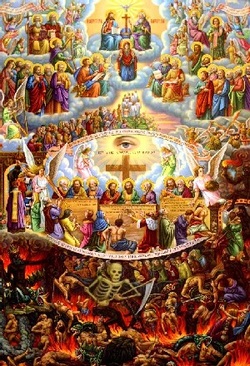
We have entered the Season of Advent and most of us are thinking of Christmas; in fact, I began my Christmas cards yesterday. But Advent is not about Christmas, at least in the Extraordinary Form readings; it’s about Christ’s Second Coming. The Epistle today clearly warns us to prepare ourselves, and the Gospel foretells a terrifying end of the world. The next three Sundays of Advent are less apocalyptic but no less focused on the Second Coming. They say nothing about the birth of the baby Jesus, nor do we hear any Messianic prophecies, as in the Ordinary Form readings. Advent, at least in the Extraordinary Form, is meant to focus us on the Second Coming of Christ, not his First Coming. What if Christ were to return to earth during this “Holiday Season.” Would we be ready for him? Would the world, which has removed the very name of Christ from Christmas, be ready for him? Here he comes, and there we are, waiting in line at Macy’s, or fuming with road rage on the way to the mall. If Christ knocked on your door an hour before your big Christmas party, would you let him in? “Honey, tell whoever it is to come back next week—I’ve got so much to do before the guests arrive!” I’m not forbidding Christmas parties, but let’s try to keep Advent in focus. Our priority during Advent, and Christmas, is not social fun, but prayer and Christian love and almsgiving, some measure of penance. Our Christmas parties and shopping and tinsel are fine, if we keep them within the authentic purpose of the liturgical season. The coming Kingdom of Jesus Christ is the guiding purpose of Advent.
People will die of fright
On the First Sunday of Advent, as I said, we hear of confusion and terror: the sea and the waves will roar; the powers of the heavens will be shaken. “Nations will be in dismay; people will die of fright in anticipation of what is coming.” It is for these days that we must prepare, because they will surely come. At His First Coming, God came as a darling baby on the lap of his childlike mother Mary. At His Second Coming, Christ will come on the clouds with power and great glory, his authority fully manifest. “When these things begin to pass, look up, because your redemption is at hand.” We are preparing for our redemption, for we are not yet redeemed—it is “at hand,” it is near, but not yet here. God’s judgment on our lives, His sentence on our time, has yet to come. Everyone in this church today (especially me) could end up in hell, and it would be an unspeakable tragedy if even one of us were eternally damned. Advent calls us to keep this danger in mind during our Christmas parties and shopping adventures, but also to keep in mind the proximity of our redemption. Now is the time to prepare for judgment; now is the time to hope for redemption.
Prepare
How do we keep a good Advent? Many Americans begin the “Christmas Season” with the new civic holiday we call “Black Friday.” The very name indicates a culture that was once Christian but has become the negative image of what it once was. Children of the light, St. Paul says, “throw off works of darkness.” If we’ve thrown Christ out of Christmas, then indeed it is a “Black Friday.” Do we prepare for Christ by eating and drinking? Again, St. Paul: “not in orgies and drunkenness, rather, make no provision for the desires of the flesh.” Folks, we are supposed to lose weight in this season, at least before December 25. But we do live in a time that ignores and despises the Word of God. Yet everything but the Word of God will burn in the universal fires at the end of human history.
There is a true Advent, and there is a false Advent. The false is the negative image of the true. The true Advent has gradually been turned upside down, and we don’t often stop to think about it. Christians are to practice deeper prayer, charity, and mortification in the weeks leading up to Christmas. Funny thing is, we mostly do just the opposite. We pray less and we eat more. We waste more money at Christmas on more banalities, precisely at the time the Church urges us to simplify, to spend less time and money on distractions. Let’s try to refocus, to direct that time and money this time of year on the things that last: on deeper prayer, on sacrificial and heartfelt charity. Advent is a time to remember the neediest, to give gifts without expecting a return.
Our Lady
In the end, Advent prepares us for our own death, and the death of our world as we know it. Deep down, we long for the death of all that is imperfect and sinful, so that we can enter into a new and perfect life. Death is hard, and more than anyone, we need our Blessed Mother at the hour of our death. Our mother brings us to birth, and God has ordained that she be with us at the hour of our death. If Advent points us to the end of all things and the beginning of a new Kingdom, then Our Lady must be a large part of Advent and Christmas. And indeed she is, on almost every Christmas card and still (Deo Gratias) on US Postal stamps. Even as we shop and have parties and write cards, let us bring Jesus and Mary to every Advent activity—a decade of the rosary or the Angelus and some real Christmas carols at every Christmas party—so that we will be prepared to meet Christ when he returns to earth.



 RSS Feed
RSS Feed